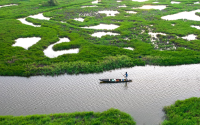15 December 2006Alok Jha
Planting trees to combat climate change is a waste of time, according to a study by ecologists who say that most forests do not have any overall effect on global temperature, while those furthest from the equator could actually be making global warming worse.
"The idea that you can go out and plant a tree and help reverse global warming is an appealing, feel-good thing," said Ken Caldeira of the global ecology department at the Carnegie Institution of Washington in Stanford, California, a co-author of the study. "To plant forests to mitigate climate change outside of the tropics is a waste of time."
The carbon dioxide used by trees for photosynthesis helps cool the Earth by reducing greenhouse gases in the atmosphere. But forests also trap heat from the sunlight they absorb.
Professor Caldeira and his colleague Govindasamy Bala, of the Lawrence Livermore National Laboratory, also in California, said that outside a thin band around the equator, forests trap more heat than they help to get rid of by reducing CO2
Their research comes in the wake of criticism from scientists of forestry schemes to offset carbon emissions, which they argue let consumers carry on polluting with a clear conscience. The schemes are big business; within three years, the market is expected to reach £300m.
Dr Bala's study, the first simulation to link carbon dioxide and the heat-absorbing effect of trees, found forests had different effects on global warming depending on latitude. He is to present his findings at the American Geophysical Union's meeting in San Francisco today.
"North of 20 degrees [latitude] forests had a direct warming influence that more or less counterbalanced the cooling effect of carbon removal from the atmosphere," said Prof Caldeira. Past 50 degrees, forests warmed the Earth by an average of 0.8C. But in the tropics forests helped cool the planet by an average of 0.7C.
Dr Bala explained that forest canopies, because they are relatively dark, absorbed most of the sun's rays heating falling on them. Grassland or snowfields, however, reflected more sun, keeping temperatures lower. Planting trees above 50 degrees latitude, such as in Siberia, could cover tundras normally blanketed in heat-reflecting snow.
In the tropical regions, though, water evaporating from trees increased cloudiness, which helped keep the planet cool.
John Coequyt, of Greenpeace USA, said: "We have always come down on limiting the credits you give to countries and companies that use forestry policy to mitigate climate change."
Prof Caldeira said planting trees was a diversion, letting consumers pollute more. He said it would be better to transform the way energy was derived and used, for instance through investment in renewable and carbon-free electricity generation.
http://environment.guardian.co.uk/print/0,,329663302-121568,00.html






